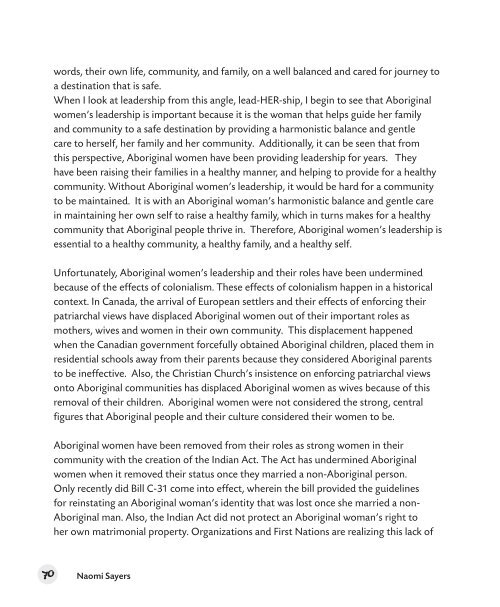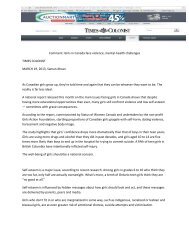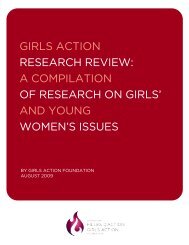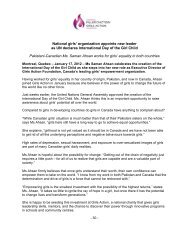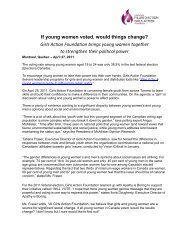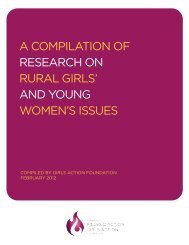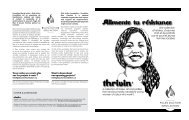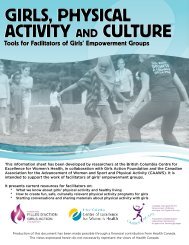Aboriginal - Girls Action Foundation
Aboriginal - Girls Action Foundation
Aboriginal - Girls Action Foundation
You also want an ePaper? Increase the reach of your titles
YUMPU automatically turns print PDFs into web optimized ePapers that Google loves.
words, their own life, community, and family, on a well balanced and cared for journey to<br />
a destination that is safe.<br />
When I look at leadership from this angle, lead-HER-ship, I begin to see that <strong>Aboriginal</strong><br />
women’s leadership is important because it is the woman that helps guide her family<br />
and community to a safe destination by providing a harmonistic balance and gentle<br />
care to herself, her family and her community. Additionally, it can be seen that from<br />
this perspective, <strong>Aboriginal</strong> women have been providing leadership for years. They<br />
have been raising their families in a healthy manner, and helping to provide for a healthy<br />
community. Without <strong>Aboriginal</strong> women’s leadership, it would be hard for a community<br />
to be maintained. It is with an <strong>Aboriginal</strong> woman’s harmonistic balance and gentle care<br />
in maintaining her own self to raise a healthy family, which in turns makes for a healthy<br />
community that <strong>Aboriginal</strong> people thrive in. Therefore, <strong>Aboriginal</strong> women’s leadership is<br />
essential to a healthy community, a healthy family, and a healthy self.<br />
Unfortunately, <strong>Aboriginal</strong> women’s leadership and their roles have been undermined<br />
because of the effects of colonialism. These effects of colonialism happen in a historical<br />
context. In Canada, the arrival of European settlers and their effects of enforcing their<br />
patriarchal views have displaced <strong>Aboriginal</strong> women out of their important roles as<br />
mothers, wives and women in their own community. This displacement happened<br />
when the Canadian government forcefully obtained <strong>Aboriginal</strong> children, placed them in<br />
residential schools away from their parents because they considered <strong>Aboriginal</strong> parents<br />
to be ineffective. Also, the Christian Church’s insistence on enforcing patriarchal views<br />
onto <strong>Aboriginal</strong> communities has displaced <strong>Aboriginal</strong> women as wives because of this<br />
removal of their children. <strong>Aboriginal</strong> women were not considered the strong, central<br />
figures that <strong>Aboriginal</strong> people and their culture considered their women to be.<br />
<strong>Aboriginal</strong> women have been removed from their roles as strong women in their<br />
community with the creation of the Indian Act. The Act has undermined <strong>Aboriginal</strong><br />
women when it removed their status once they married a non-<strong>Aboriginal</strong> person.<br />
Only recently did Bill C-31 come into effect, wherein the bill provided the guidelines<br />
for reinstating an <strong>Aboriginal</strong> woman’s identity that was lost once she married a non-<br />
<strong>Aboriginal</strong> man. Also, the Indian Act did not protect an <strong>Aboriginal</strong> woman’s right to<br />
her own matrimonial property. Organizations and First Nations are realizing this lack of<br />
70 Naomi Sayers


